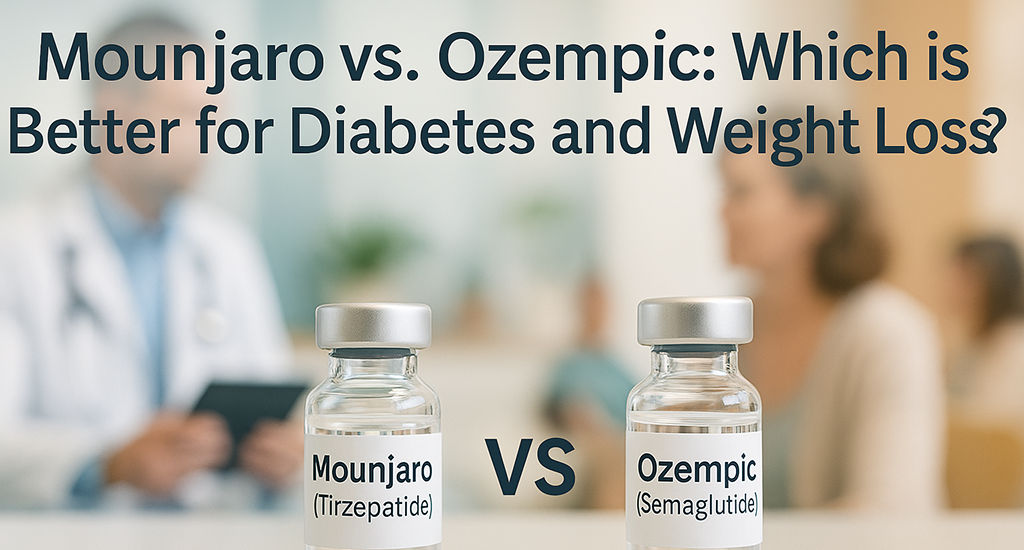Diabetes Management
Mounjaro vs. Ozempic: Which is Better for Diabetes and Weight Loss?
4 min read
By Apollo 24|7, Published on - 29 March 2025, Updated on - 06 September 2025
Share this article
0
2 likes

When treating type 2 diabetes, it can feel like solving a maze to find the right medication. Medications such as Mounjaro and Ozempic have been popular in recent years not only because of how they help control blood sugar levels but also because of how they can help with weight loss. With so many choices out there, it is hard to discern which is the best for you. In this article, we'll dissect Mounjaro vs. Ozempic, compare their efficiency, side effects, and price, and assist you in making an informed choice.
How Do Mounjaro and Ozempic Work?
Both drugs regulate blood sugar levels and lead to weight loss, but they act on different hormones:
- Ozempic (Semaglutide) – Imitates GLP-1, a hormone which slows down the digestion process, suppresses hunger and allows the pancreas to secrete more insulin.
- Mounjaro (Tirzepatide) – Acts on two hormones (GLP-1 + GIP), hence more potent in reducing blood sugar and aiding weight loss.
Since Mounjaro acts on two pathways, it tends to have superior outcomes in both diabetes and weight control than Ozempic.
Effectiveness: Mounjaro vs. Ozempic
Both Mounjaro and Ozempic are very effective in controlling blood sugar and weight loss. Their action mechanisms, however, are different, and this may make a difference based on your requirements.
Effectiveness On Blood Sugar Control
Effectiveness On Weight Loss
Side Effects: What to Expect?
As with all medicines, both Ozempic and Mounjaro may have potential side effects. It is important to balance these against the advantage and speak to your doctor prior to changing treatment.
Rare but serious side effects of both medications include pancreatitis or thyroid tumours (according to animal studies), so it is important to consult your doctor before starting any medicine.
Cost Comparison: Mounjaro vs. Ozempic in India
The cost of diabetes medication is always an essential consideration when making treatment decisions. Although Mounjaro is newer and perhaps more costly, its efficacy could prove to be worth the cost in some individuals. Alternatively, Ozempic has been around longer, and its cost could be more reasonable, particularly as generic forms become available.
- Mounjaro Cost in India: In India, Mounjaro may be quite expensive, particularly for individuals without insurance. It may cost anywhere from ₹14,000 to ₹18,000 per month for a standard dose, depending on the pharmacy.
- Ozempic Cost in India: Ozempic is relatively more affordable, costing between ₹10,000 and ₹12,000 a month, depending on the dosage and pharmacy. As it has been in the market for some time, it is more readily available, and some insurance policies might subsidize a part of the expense.
Which is Best for You?
Choosing between Mounjaro and Ozempic is based on your personal needs and desires. Here are some of the most important factors to keep in mind:
- If you require more dramatic weight loss: Mounjaro may be the better choice, as it is more likely to result in more weight loss than Ozempic.
- If you prefer a less expensive option: Ozempic may be the better choice, particularly if cost is a significant factor.
- If you have experienced side effects with one medication: You might want to try the other, since every drug impacts people differently.
- It is always best to ask a doctor first. Your healthcare provider is able to evaluate your particular condition, determine whether you might expect side effects, and make a suggestion for the proper treatment plan.
When to Book a Consultation?
If you are not certain what medication is best for you or have some concerns regarding your diabetes management, making a consultation appointment with a doctor is an excellent move. You can even book a doctor’s consultation and get Mounjaro via Apollo24|7, where specialists can assist you through the procedure and make a well-informed choice.
Conclusion
Finding the right diabetes medication is an important step towards better health. Whether you choose Mounjaro or Ozempic, both medications offer significant benefits, but it’s essential to choose the one that best suits your health goals, lifestyle, and budget. If you have any doubts or need further guidance, don’t hesitate to reach out to a healthcare professional through Apollo24|7.
Diabetes Management
Consult Top Diabetologists
View AllFrequently Asked Questions
Can Mounjaro and Ozempic be used together?
Can Mounjaro and Ozempic be used together?
How long does it take to see results from Mounjaro or Ozempic?
How long does it take to see results from Mounjaro or Ozempic?
Are Mounjaro and Ozempic safe for long-term use?
Are Mounjaro and Ozempic safe for long-term use?
Can I use Mounjaro or Ozempic if I don’t have diabetes?
Can I use Mounjaro or Ozempic if I don’t have diabetes?
Is there any financial assistance available for Mounjaro and Ozempic in India?
Is there any financial assistance available for Mounjaro and Ozempic in India?
Leave Comment
Recommended for you
.jpg?tr=q-80)
Diabetes Management
Boosting Immunity with Food: A Guide for Diabetics
Boosting your immunity as a diabetic? Learn how certain foods can help! From green leafy vegetables to oily fish, discover the beneficial impact these foods can have on your immune system. But remember, diet is just one aspect. For a holistic approach to managing type 2 diabetes, check out the Apollo Super 6 program. It's designed to help you manage your condition through lifestyle changes and gives you access to expert consultations, webinars, and much more.

Diabetes Management
How to Crush Sugar Cravings in Diabetes?
To manage diabetes, combat sugar cravings with fresh fruits, protein, and fiber. Practice mindful eating, stick to regular meals, and plan to avoid impulsive indulgences. Use portion control, sugar substitutes, and natural options like cinnamon. Regular exercise, stress management, and guidance from a dietitian aid in effective diabetes management.
.jpg?tr=q-80)
Diabetes Management
What Should You Consider Before Alcohol Intake in Diabetes?
Considering alcohol intake with diabetes requires caution. Individuals must monitor blood glucose levels, prioritise moderation, and choose low-carb options such as light beer, dry wines, and distilled spirits. Opting for sugar-free mixers, mindful timing, and staying hydrated are essential. Awareness of medication interactions, symptom monitoring, and informing others about one's condition are crucial steps. Regular health check-ups ensure a holistic approach.
Subscribe
Sign up for our free Health Library Daily Newsletter
Get doctor-approved health tips, news, and more.
Visual Stories

8 Fruits That are Incredibly Healthy for Diabetes
Tap to continue exploring
Recommended for you
.jpg?tr=q-80)
Diabetes Management
Boosting Immunity with Food: A Guide for Diabetics
Boosting your immunity as a diabetic? Learn how certain foods can help! From green leafy vegetables to oily fish, discover the beneficial impact these foods can have on your immune system. But remember, diet is just one aspect. For a holistic approach to managing type 2 diabetes, check out the Apollo Super 6 program. It's designed to help you manage your condition through lifestyle changes and gives you access to expert consultations, webinars, and much more.

Diabetes Management
How to Crush Sugar Cravings in Diabetes?
To manage diabetes, combat sugar cravings with fresh fruits, protein, and fiber. Practice mindful eating, stick to regular meals, and plan to avoid impulsive indulgences. Use portion control, sugar substitutes, and natural options like cinnamon. Regular exercise, stress management, and guidance from a dietitian aid in effective diabetes management.
.jpg?tr=q-80)
Diabetes Management
What Should You Consider Before Alcohol Intake in Diabetes?
Considering alcohol intake with diabetes requires caution. Individuals must monitor blood glucose levels, prioritise moderation, and choose low-carb options such as light beer, dry wines, and distilled spirits. Opting for sugar-free mixers, mindful timing, and staying hydrated are essential. Awareness of medication interactions, symptom monitoring, and informing others about one's condition are crucial steps. Regular health check-ups ensure a holistic approach.
